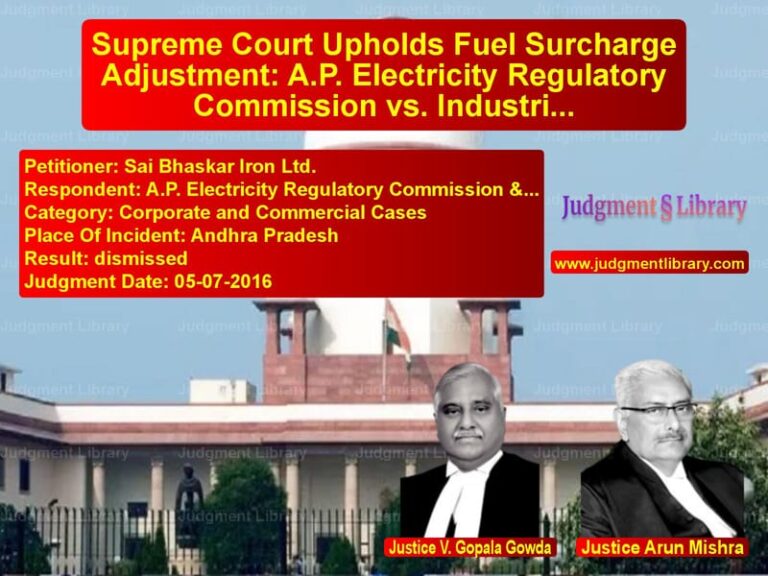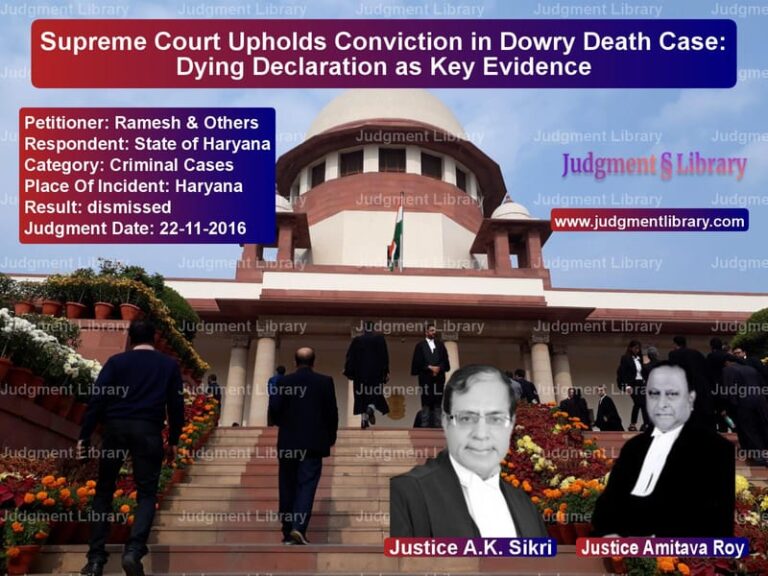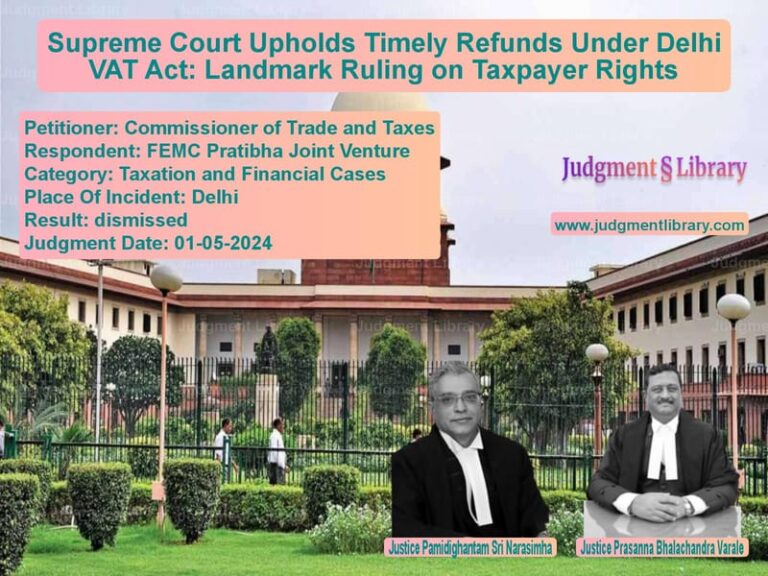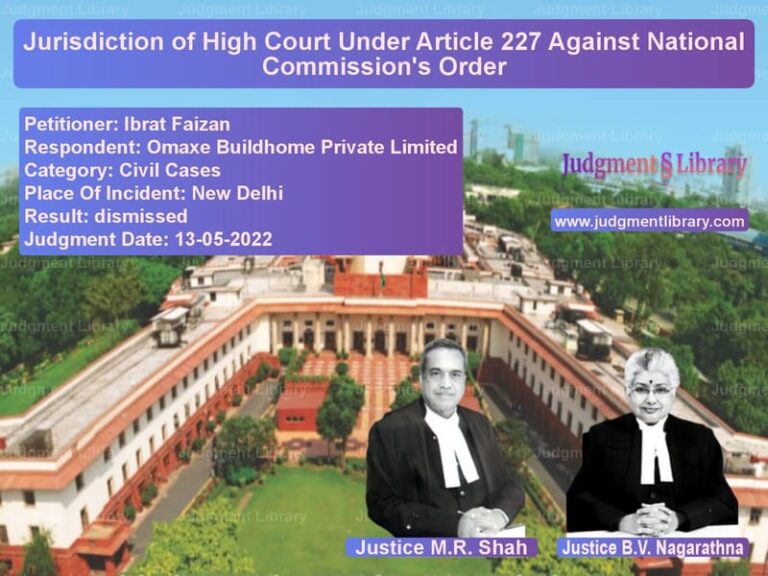Supreme Court Quashes TADA Convictions Due to Procedural Violations
In a landmark ruling, the Supreme Court of India quashed the convictions of six accused under the Terrorist and Disruptive Activities (Prevention) Act, 1987 (TADA), citing procedural violations and lack of adherence to due process. The case, Seeni Nainar Mohammed vs. State Rep. by Deputy Superintendent of Police, dealt with charges under TADA and the Indian Penal Code (IPC) for the alleged murder of a Hindu Munnani leader, Rajagopalan, in 1994.
Background of the Case
The case originated from the murder of Rajagopalan, the President of the Hindu Munnani Association, who was attacked and killed outside his house in Madurai on October 10, 1994. The prosecution alleged that the accused, Seeni Nainar Mohammed (A-6), Shahul Hameed (A-1), Raja Hussain (A-2), Zubeir (A-3), Zakir Hussain (A-4), and Azeez (A-5), conspired to commit the murder to create communal unrest and terror.
The case was initially investigated by the local police but was later transferred to the CBI. The prosecution relied heavily on the confessions of the accused, eyewitness testimonies, and forensic evidence to secure convictions under Sections 120B, 302, 147, 148, and 149 of IPC and Sections 3(2), 3(3), and 3(4) of TADA. The trial court found the accused guilty and sentenced them to life imprisonment.
Petitioner’s Arguments
The defense contended the following:
- The prosecution failed to prove that the murder was committed with the intention to create terror, a key requirement for invoking TADA.
- The sanction for prosecution under TADA was granted mechanically, without proper application of mind.
- The confessions of the accused were recorded under coercion and were not voluntary.
- The prosecution suppressed key evidence, including contradictions between different witness statements.
Respondent’s Arguments
The prosecution defended the convictions by arguing:
- The accused were part of a larger conspiracy to eliminate Hindu leaders and create communal discord.
- Eyewitness testimonies confirmed the direct involvement of the accused.
- The accused had a history of involvement in extremist activities.
Supreme Court’s Observations
The Supreme Court, after reviewing the evidence, made the following key observations:
“The sanctioning authority has not applied its mind to the records in its entirety and granted sanction only after considering certain documents which were in English. Therefore, we have to accept the contention of the appellants that the sanction was granted mechanically.”
“For a crime to be prosecuted under TADA, the act must be intended to create terror in the minds of the public. The evidence in this case does not meet this threshold.”
“The confessions of the accused were taken while they were in the immediate custody of investigating officers and under high security. A non-voluntary confession cannot form the basis of conviction.”
Key Takeaways from the Judgment
- Procedural Safeguards in Anti-Terror Laws: The Court emphasized that procedural safeguards must be strictly followed when prosecuting cases under TADA.
- Sanction for Prosecution Must Be Well-Reasoned: The decision reaffirmed that authorities must apply their mind before granting sanction for prosecution under special laws.
- Voluntariness of Confessions: The Court ruled that coerced confessions obtained in police custody cannot be relied upon to secure a conviction.
Final Verdict
The Supreme Court quashed the convictions of all six accused, ruling that the trial court’s judgment was vitiated due to procedural lapses. The Court ordered the immediate release of the accused unless they were required in other cases.
Implications of the Judgment
This judgment sets a significant precedent for cases prosecuted under special anti-terror laws. It reinforces the need for strict adherence to procedural safeguards and ensures that laws like TADA are not misused to target individuals without conclusive evidence.
Conclusion
The Supreme Court’s ruling in Seeni Nainar Mohammed vs. State Rep. by Deputy Superintendent of Police serves as a reminder that legal procedures must be followed meticulously, especially in cases involving stringent laws like TADA. By quashing the convictions, the Court upheld the principle that justice must not only be done but also be seen to be done.
Don’t miss out on the full details! Download the complete judgment in PDF format below and gain valuable insights instantly!
Download Judgment: Seeni Nainar Mohamme vs State Rep. by Deputy Supreme Court of India Judgment Dated 27-04-2017.pdf
Direct Downlaod Judgment: Direct downlaod this Judgment
See all petitions in Custodial Deaths and Police Misconduct
See all petitions in Terrorist Activities
See all petitions in Bail and Anticipatory Bail
See all petitions in Judgment by Pinaki Chandra Ghose
See all petitions in Judgment by Rohinton Fali Nariman
See all petitions in allowed
See all petitions in Quashed
See all petitions in supreme court of India judgments April 2017
See all petitions in 2017 judgments
See all posts in Criminal Cases Category
See all allowed petitions in Criminal Cases Category
See all Dismissed petitions in Criminal Cases Category
See all partially allowed petitions in Criminal Cases Category







